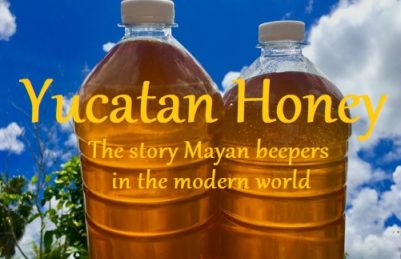
Honey of the Yucatan
The Yucatan area of Mexico is known for its Maya beekeepers and high-quality honey. Mayans have been cultivating bees for over 1000 years. It was so important to the ancient Maya that they had a god of bees and honey called Ah Mucen Kab. Even today you can climb the main temple at Coba and see bees carved in the top of the temple as proof of this. This deep culture of bees and honey runs to today.
This is the story of modern Maya and the honey trade. Yucatecan honey is known as some of the finest in the world. You will see why in our video below. But first we should mention one of the bee species found here in the Yucatan.
Special bees of the Yucatan
Imagine if bees did not sting! That would make them seem a lot friendlier wouldn’t it. Did you know there is a species of bees that lives in the Yucatan that does not sting? It is called the melipona bee. It is black and smaller than the average honeybee. Cultivating them certainly made it easier to harvest the honey without protective gear.
Melipona bees are still raised in the Yucatan. Their honey is prized because of its properties and is even used medicinally. Since the melipona bees produce in smaller amounts, it is also much more expensive. Usually, this honey can only be found in specialty stores or in local communities.
Like many bee colonies around the world, these are in decline. Unfortunately, the bees we collected from were not the stingless bees, but the story is just as sweet!
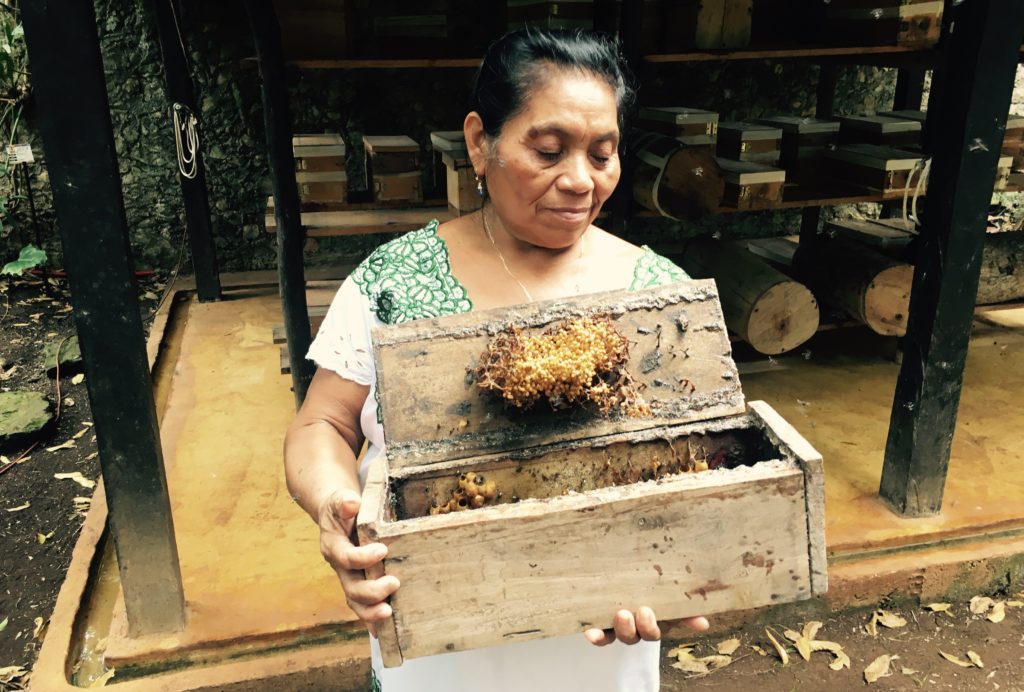
How the honey trade works in the Yucatan of Mexico
Most of the honey in the Yucatan is collected by small scale farmers. It is often a side business to the other production of food. Bees are often kept in spacious backyards or out in the areas around towns where people farm.
Since the weather is sunny and warm year-round, bees produce honey all the time depending on the flowers and rain, honey is collected about every 20 days in the Yucatan.
Collection of honey
When it is time to collect honey, there is a lot of preparation work. The farmers need smokers, a sharp knife for scrapping the honeycombs, protective gear, and an extractor. It is usually best done with several people so the process can go smoothly, and each person can do one job.
Why do beekeepers use smoke?
Smoke is used to calm the bees. In the Yucatan beekeepers will dry corn cobs in the smoker and light it on fire. The slow burning gives off smoke. The smokers can be pumped so it releases more smoke when needed. The beekeepers keep the smoke close to them to help keep the bees away.
When we were out with the beekeepers, we noticed that even if you were far away from the colonies of bees, there would be a lot of them around you. Being close to the boxes of bees with smoke was better off for you.
Protecting yourself when collecting honey
Since the Yucatan is normally warm year-round, it may look funny to see people in jackets going out into the fields. You do however need layers to protect from getting stung. Normally you need two pairs of pants, boots or tough shoes, gloves, hat with screen, and three layers of shirts.
All of this clothing and layers makes for a hot time collecting honey. Even though this work is done in the morning, it still is around 26 C (80 F). Depending on how many colonies of bees there are, it may take about three hours on average to collect the honey and extract it. All of the time you need to be dressed with the protective gear.
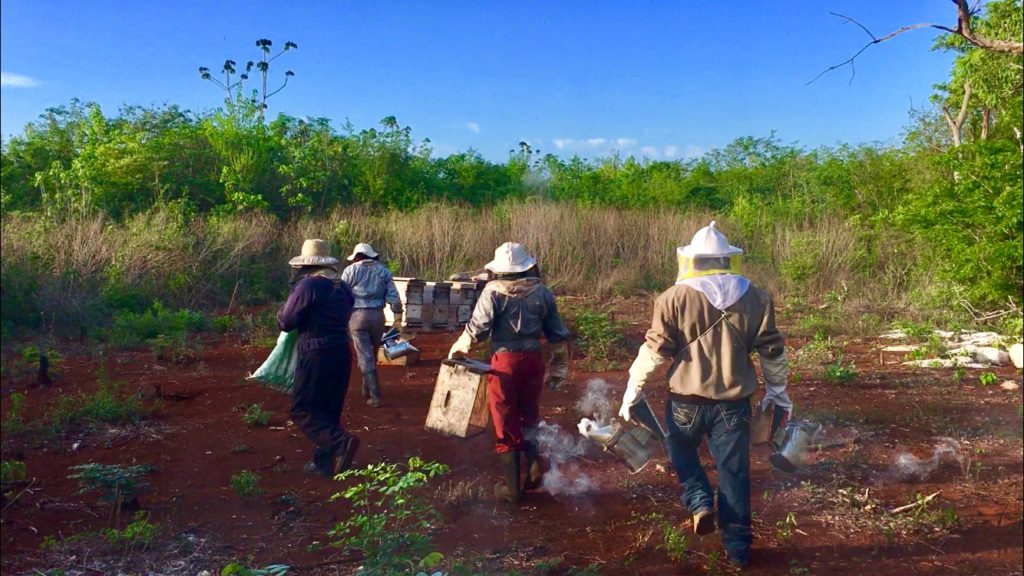
The process of getting the honey out
After the beekeepers have gotten all the protective gear on, they make the final approach to the colonies. They will open one box at a time to pull out the panels. A soft brush is used to brush off the bees and then the honeycomb panel is put in an extra box. After one box is filled up with panels it is taken to the extractor.
The beekeepers place the extractor about 100 yards away. This gives them a little space with less bees, but they still need to keep on the protective clothing.
The honeycomb panels need to be cut open so the honey will run out. Once they do this, it is put into the extractor. The extractor is basically a hand turned centrifugal force spinner. This spins out a lot of the honey but still leaves some in the comb so the bees can use it for food.
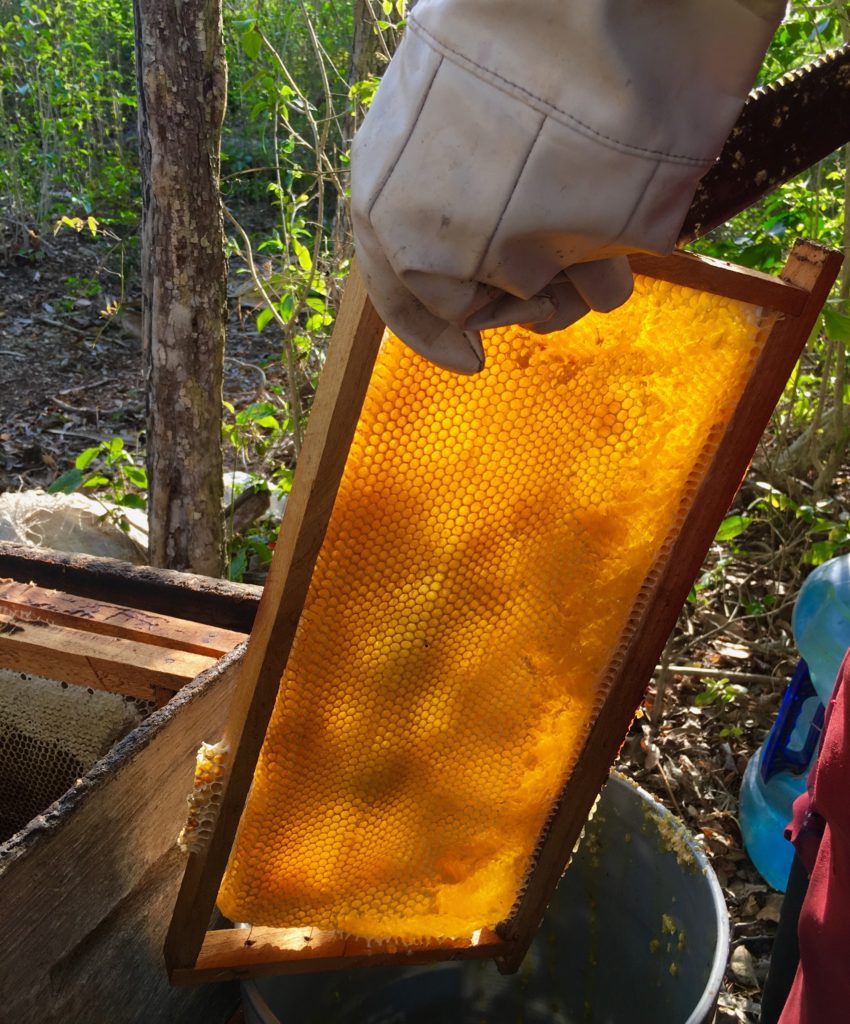
Collection points and distribution
Once farmers have collected honey it is taken in buckets to collection points. Here the honey is weighed a bought by the kilo. The price of the honey depends on the amount being produced in the region. Usually there is a 15-peso swing in the price of honey per kilo.
The collection points sell to stores and distributors. Sometimes the honey goes through a straining process here. When honey is collected it has wax and bees stuck in it. Honey needs to be strained to take out this.
How you can help these Mayan beekeepers
We love supporting hard working people in the area and also preserving the culture. We have teamed up with two businesses in Playa Del Carmen that will help support these beekeepers.
The first one is loQsea.com. This is a grocery delivery service in Playa Del Carmen. They offer a great service for people coming to the area that don’t want to spend time shopping. They also are a good service for residents as well. loQsea.com is always adding more services and things they can deliver. We encourage you to check them out here.
For the month of June, they will be donating a portion of online tips to these Mayan beekeepers. So, if you order from them already, we hope you can tip them online and help support these farmers. If you are not a customer already, it is easy to sign up and even easier to get things delivered to your door.
If you love honey, you should really try this honey. After seeing it collected in our video and all the work that goes into it you will no doubt have a better appreciation of it. You will also know that the product you are getting is of high quality.
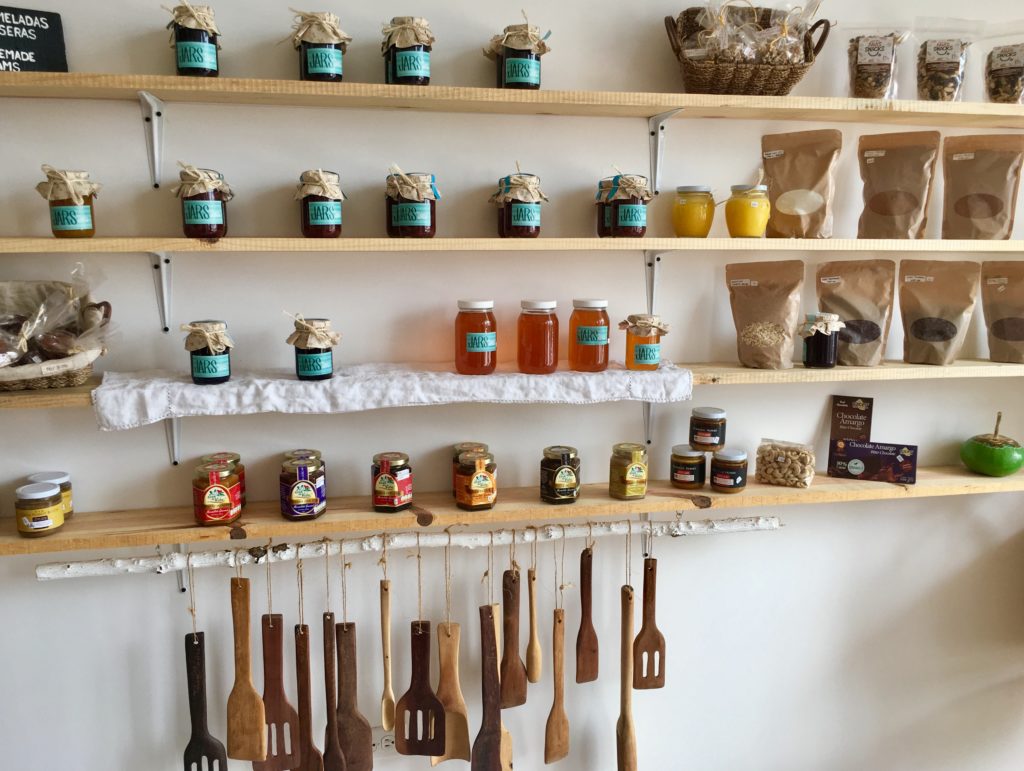
Interesting facts about bees
Just to give you more appreciation for the honeybee, here are some facts you can think about.
- The months February to June in the Yucatan usually produce the most honey.
- Bees buzz because they move their wings 200 times per second.
- Bees can fly at 15 miles per hour and up to 6 miles. That is why when you are biking a bee can keep up with you.
- It takes 1000 flowers to produce one spoonful of honey.
- On one trip a bee will visit 50-100 flowers.
- Bees have 6 legs.
- The queen bee can live 5 years.
Thank you for reading our article about honey in the Yucatan. We hope you found it interesting and get to try some when you are in the area.
If you like reading about the local culture, you might like reading our article on Mayan houses or traditional local foods.
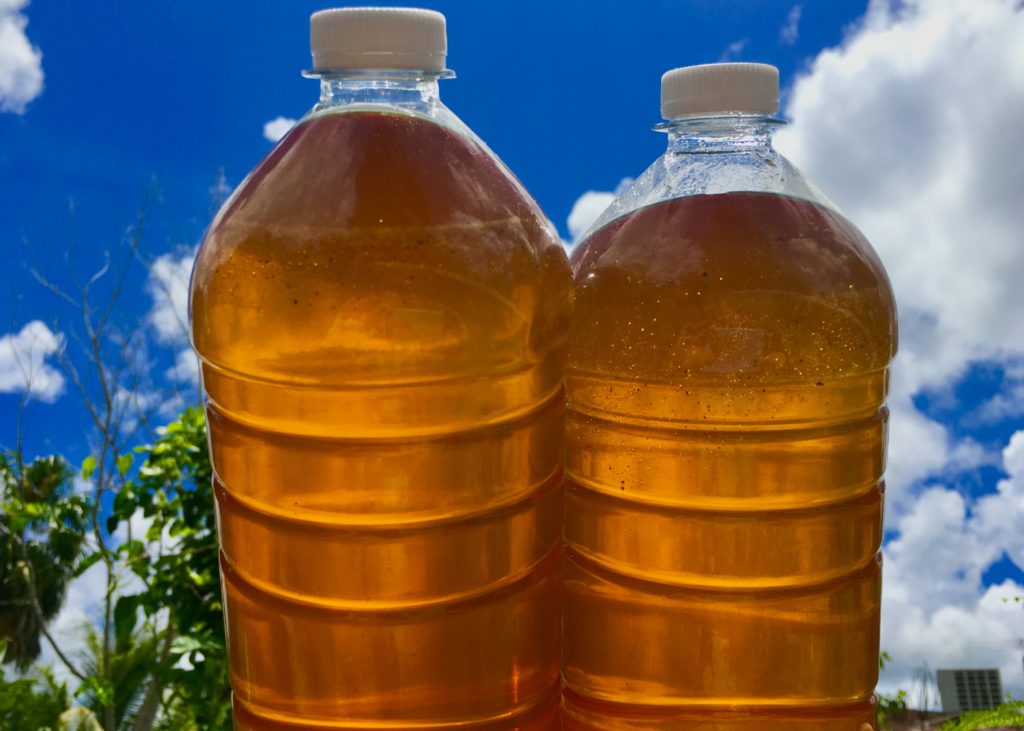


I recently learned that the correct word is Maya, not Mayan. Mayan is used only in reference to the language the Maya spoke! The houses and people are Maya. Most people make this mistake.
This is true and why the Riviera Maya is called Maya. Locally both terms are used frequently and it is hard to use the technically correct term. We will work on using correct terminology.
My husband and I visited the Maya area this spring. We bought some honey that is extremely delicious. We was told that it came from bees that only make honey once a year. What kind of bee and honey is that?
They were probably refereeing to the melipona bees in the Yucatan. These are much smaller and stingless but they do produce honey year round, just not a lot of it. The honey is more expensive and used for medicinal purposes.
The pre amble at the start of the honey story states the bees do not sting….but the video about collecting takes about and shows people in double protective clothing and gloves, etc Etc…also wanted to see them gathering the honey and the video is only about one minute longM what’s up?
We mention the stingless bees because they are unique to the area but we do say there are the kind of bees that sting. We did say in the article ” Unfortunately the bees we collected from were not the stingless bees, but the story is just as sweet!” The video is over 8 minutes long and shows a lot of the process so we are not sure why you only say it is one minute.
How can I get some of this Honey in the USA?
Some stores do sell honey from the Yucatan but we don’t know what ones do. You will need to plan a trip here. You can get it fresh and unprocessed. It is yummy!
where can I get sour honey
Do you mean our honey? We don’t sell it direct but there is a bakery in Playa that gets it and has it for sale. It is Das Brat Bakery on Calle 8 between 20 and 25th Avenues.